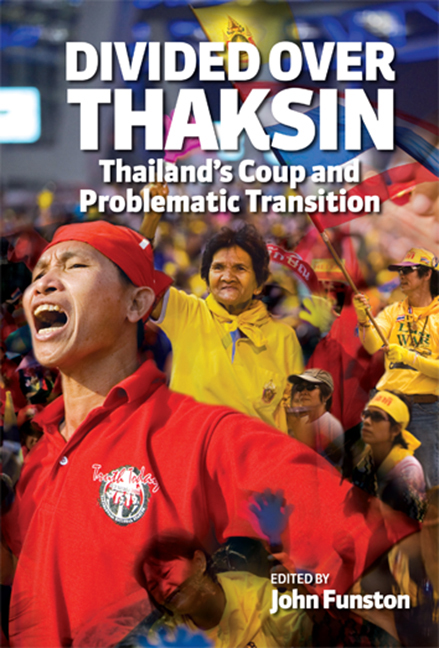Book contents
- Frontmatter
- Contents
- List of Tables and Figures
- List of Contributors
- Preface
- Introduction
- 1 Political Contests in the Advent of Bangkok's 19 September Putsch
- 2 The Tragedy of the 1997 Constitution
- 3 The NESAC, Civil Society, Good Governance and the Coup
- 4 Military Coup and Democracy in Thailand
- 5 Deconstructing the 2007 Constitution
- 6 Thailand's 2007 Constitution and Re-Emerging Democracy: Will Political Polarization Continue?
- 7 Untying the Gordian Knot: The Difficulties in Solving Southern Violence
- 8 Another Country: Reflections on the Politics of Culture and the Muslim South
- 9 Governance in the South: Is Decentralization an Option?
- 10 Tradition and Reform in Islamic Education in Southern Thailand
- 11 The Economy under the Thaksin Government: Stalled Recovery
- 12 The Thai Economy after the Coup
- 13 The Impact of Political Uncertainty on Business
- Index
1 - Political Contests in the Advent of Bangkok's 19 September Putsch
Published online by Cambridge University Press: 21 October 2015
- Frontmatter
- Contents
- List of Tables and Figures
- List of Contributors
- Preface
- Introduction
- 1 Political Contests in the Advent of Bangkok's 19 September Putsch
- 2 The Tragedy of the 1997 Constitution
- 3 The NESAC, Civil Society, Good Governance and the Coup
- 4 Military Coup and Democracy in Thailand
- 5 Deconstructing the 2007 Constitution
- 6 Thailand's 2007 Constitution and Re-Emerging Democracy: Will Political Polarization Continue?
- 7 Untying the Gordian Knot: The Difficulties in Solving Southern Violence
- 8 Another Country: Reflections on the Politics of Culture and the Muslim South
- 9 Governance in the South: Is Decentralization an Option?
- 10 Tradition and Reform in Islamic Education in Southern Thailand
- 11 The Economy under the Thaksin Government: Stalled Recovery
- 12 The Thai Economy after the Coup
- 13 The Impact of Political Uncertainty on Business
- Index
Summary
INTRODUCTION
For more than three decades, since Thailand' emergence from naked military dictatorship in the early 1970s, both academic and journalistic observers have tended to view its politics as a work in progress. Extreme cynics, some historians, and a few remaining crude “cultural” determinists have resisted this Whig view of Thai developments. But its appeal has otherwise proved strong and general. A resolve to craft some sort of stable, putatively modern and democratic, idealized political order numbered among the main influences on the drafters of Thailand' 1997 constitution. The subsequent, widespread hope that the constitution would undermine money politics and see to the emergence of a collection of independent oversight bodies testified even more directly to the appeal of the idea of progress in Thai politics. Thaksin Shinawatra put paid to that hope after becoming premier in 2001. Then, the evening of 19 September 2006 brought the dismal spectacle of a twenty first-century military seizure of state power in Bangkok and the abrogation of the 1997 constitution.
On one level, the conduct of the Thaksin government and the putsch that removed Thaksin from the political arena might each seem to vindicate the cynics, historians, and the crude culturalists in their scepticism about progress in Thai politics. On a more fundamental level, however, what defined that politics during the year preceding Thaksin' ouster was a contest between two visions of where political progress should lead. Far from deadening the appeal of such visions, the year confirmed their continued relevance. Likewise, the tanks that appeared on the streets of Bangkok on 19 September in no way ended that contest. It has resumed, and, not least now that the reign of King Bhumiphol has passed the sixty-two-year mark, there is every reason to believe that that contest will only intensify in the months and years ahead.
The 19 September 2006 putsch in Bangkok came at the end of a year of endlessly confusing turns, twists, advances, and reverses on the Thai political scene. Nevertheless, these developments came in three discernible phases: September 2005–February 2006, March June 2006, and July–September 2006. These distinct phases notwithstanding, a number of factors proved important throughout the entire period.
- Type
- Chapter
- Information
- Divided Over ThaksinThailand's Coup and Problematic Transition, pp. 1 - 26Publisher: ISEAS–Yusof Ishak InstitutePrint publication year: 2009

